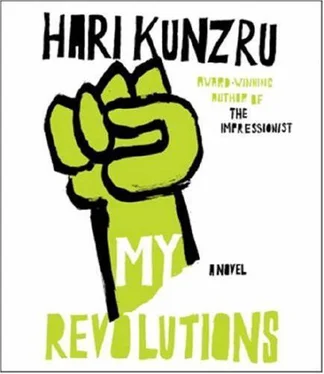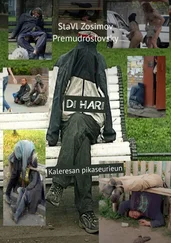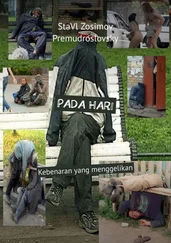“Whatever, Chris. We’ll talk about it tomorrow. There’s somewhere I need to be, but I’ll come in the cab with you. I’ll pick you up at eight tomorrow morning.”
We drove to a dingy townhouse in Fitzrovia, with a card in the window saying No Vacancies .
Miles left me in the care of an elderly landlady with a floral housecoat and no small talk. Both she and her nameless establishment seemed like survivals from an earlier era, before newfangled notions of comfort or hospitality took hold in the British hotel trade. The lobby smelled of cigarettes and carpet cleaner. The leaflets in the rack by the reception desk advertised shows and exhibitions that had long since closed. There was no sign of any other staff or guests. The woman gave me a key on a heavy brass chain and walked me arthritically upstairs to a room decorated with hunting prints and the kind of geometric-patterned wallpaper last current thirty years previously.
“What time’s breakfast?” I asked.
“I understand you’ll be taking it out. Mr. Carter’s company specified when they made the booking.”
“Mr. Carter?”
“The gentleman you were just with.”
“His name’s Bridgeman.”
“I wouldn’t know about that. Will you be going out at all?” “Yes,” I said.
“Front door’s locked after ten.”
Grudgingly she accepted that the night porter would let me in if I was late, then quit the room, shutting the door smartly behind her. Contemplating the hospital corners on the bedsheets, the small cake of soap and the paper-wrapped toothbrush mug on the basin, I was filled with foreboding. All British state institutions, whatever their purpose, share an atmosphere. When I was growing up they used to share a smell too, an alkaline reek that united school and hospital and prison and dole office, and always triggered in me a kind of cellular-level panic, a fight-or-flight reflex. The smell has gone, abolished along with so many of the visible signs of power (in dark moments I think it’s all my generation achieved, killing that smell), but even without it the atmosphere remains and that room had it: old and cold and abstractedly cruel.
I grabbed my coat and half-ran down the stairs, ignoring the landlady’s barked inquiry about the key. The evening had turned cold and the few people on the street were hurrying along, hunched into coats and scarves. I headed for the tube station. At that moment my plan, in so far as I had one, was to get on a train, any train. I had a cash card. I could withdraw some money, go somewhere, start again. How far would I get on two hundred quid? Little by little, I slowed my pace. I knew I was panicking, not thinking clearly. On impulse I turned a corner. Up ahead I saw the lights of Oxford Street. Basics, Chris, I told myself. Remember the basics. Miles will have you followed.
The wind whipped at my face. I lingered outside a cinema on the Tottenham Court Road, using the glass window to watch the
street behind me. Then I made my way into Soho, loitering in alleyways, ducking in and out of video stores and bookshops, trying to spot my tail. In a basement, as I pretended to browse bondage magazines alongside a row of suburban commuters, I finally picked him out, a young guy in jeans and a hooded sweatshirt who looked out of place among the briefcases and thinning hair. I led him toward Regent Street and lost him in a department store, shouldering my way back out through the late-night shoppers and jumping on a bus outside. It was only then, as I sat on the top deck, breathless, eye-level with the advertising hoardings of Piccadilly, that I realized how I’d been addressing myself. Turn left, Chris. Don’t look behind you, Chris. For years I’d trained myself to be Mike Frame. I’d settled down in him, ceased even to think of who I’d been before, but Miles had uprooted me with a few short conversations. In itself that didn’t matter, except that if Mike Frame went, Miranda and Sam would go with him.
Oh, Sam.
Once upon a time I’d been prepared. When I worked at Olla’s new age shop I’d kept a metal cash box hidden in the storeroom, containing money and an American passport I’d bought on the street in Bangkok. Then Miranda and her fatherless baby had come into my life. Mike Frame had applied for a bank account, a national insurance number. The identity held up. After a couple of years he renewed his British passport to go on a camping holiday in Spain, where he baffled his partner with his nervousness at the airport and his interest in relics of the Civil War. Chris Carver had tried to escape the state, but Mike Frame eagerly embraced it. Each database record, each countersigned form confirmed his reality, put flesh on his bones. Little by little, the running money got spent. The American passport expired. Michael Frame started to seem like an end, a final destination. Looking back, I think I closed my escape routes deliberately. I didn’t have it in me to run again; which is, I suppose, another way of saying I’d gotten old.
I stepped off the bus near Victoria station. In a brightly lit Indian restaurant tricked out with laminate flooring and contract furniture,
totally unlike the flock-wallpapered haven I’d hoped for, I ate chickpeas and drank several pints of lager. I paid the bill and stood swaying slightly on the pavement, knowing that I was going to have to face whatever Miles had in store for me. I went into an off-licence and bought a half-bottle of vodka, then hailed a cab and went back to the hotel, where I lay on the bed and drank shots out of the tooth-mug, embalmed in the swirling patterns and petrol fumes of 1970.
* * *
Sean raced out of prison like a greyhound chasing a hare. Before we’d even got him back to Thirteen he was making war plans. The Tupamaros had shown the way in Uruguay. Urban guerrilla: a small band, operating in the city, using the terrain to our advantage like peasant revolutionaries used the mountains. Street corners and tower blocks our Sierra Maestra. And cars. Cars featured heavily in Sean’s plans for our future.
We were the vanguard party in embryo. We would lead the way. We’d be exemplary and we’d be self-sustaining. So there would be fast cars, stolen and stored in lock-ups or sold to get money. There would be money and with the money we’d buy arms. There would, above all, be no more waiting, no more frustrating attempts to persuade others of the urgency for change.
It felt like spring twice over. Without Sean, Anna’s intense cold had spread through all of us, sealing us into a sort of mute despair. Now the ice had gone from the windows at Thirteen. At the back of my mind there was a twinge of resentment at the way Sean could push things forward so easily. He and Anna spent long hours on the mattresses, plotting and whispering to each other. In Criticism-Self-Criticism I chipped away at their exclusivity. We were still opposed to monogamy, weren’t we? Anna accused me of being manipulative. I had a misogynistic desire to dominate. I was trying to force her back into my bed. I told her she was being arrogant. My only concerns were political.
We got the explosives out of the phone book. Sean had formulated a baroque plan to stake out construction sites and mines, then follow trucks to find out where they went. Without directly contradicting him, Anna visited the local library and came back with a list of ten demolition contractors, all within fifty miles of
London. The theft went smoothly enough. There was a company out in Grays, along the Thames estuary, which had a yard by the river, at the end of a desolate lane strewn with car tires. The only guard was an old man who sat and read model-railway magazines in a hut by the gate, his head framed in a little yellow square of electric light. We parked on a patch of wasteground and watched the oily black water, waiting for a cloud to obscure the moon.
Читать дальше












